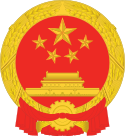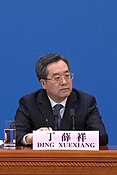
Back Místopředseda Státní rady Čínské lidové republiky Czech Vizeministerpräsident der Volksrepublik China German Vicepremier de la República Popular China Spanish Vice-Premier ministre du Conseil des affaires de l'État de la république populaire de Chine French Wakil Perdana Menteri Republik Rakyat Tiongkok ID 国務院副総理 Japanese Vice-primeiro-ministro da República Popular da China Portuguese Vice Premier of the People's Republic of China SIMPLE Віце-прем'єр Державної ради Китайської Народної Республіки Ukrainian Phó Tổng lý Quốc vụ viện Cộng hòa Nhân dân Trung Hoa Vietnamese
| Vice Premier of the State Council of the People's Republic of China | |
|---|---|
| 中华人民共和国国务院副总理 | |
 | |
| State Council of the People's Republic of China | |
| Style | Vice Premier (副总理) (informal) |
| Status | Deputy-national leader level official |
| Member of |
|
| Reports to | Premier of the State Council |
| Residence | Premier's Office, Zhongnanhai |
| Seat | Beijing |
| Nominator | Premier of the State Council |
| Appointer | President pursuant to a National People's Congress decision |
| Term length | Five years, renewable once consecutively |
| Constituting instrument | Constitution of China |
| Precursor | Vice Premier of the Government Administration Council of the Central People's Government |
| Inaugural holder | Chen Yun |
| Formation | September 1954 |
| Website | State Council |
| Vice Premier of the State Council of the People's Republic of China | |||||||||
|---|---|---|---|---|---|---|---|---|---|
| Simplified Chinese | 中华人民共和国国务院副总理 | ||||||||
| Traditional Chinese | 中華人民共和國國務院副總理 | ||||||||
| |||||||||
| Alternative Chinese name | |||||||||
| Simplified Chinese | 国务院副总理 | ||||||||
| Traditional Chinese | 國務院副總理 | ||||||||
| |||||||||
 |
|---|
|
|
The vice premiers of the State Council of the People's Republic of China are high-ranking officials under the premier and above the state councillors and ministers.[1] Generally, the title is held by multiple individuals at any given time, with each vice-premier holding a broad portfolio of responsibilities. The first vice-premier takes over duties of the premier at the time of the latter's incapacity. The incumbent vice premiers, in order of rank, are Ding Xuexiang, He Lifeng, Zhang Guoqing and Liu Guozhong.
The highest-ranked office holder is informally called the Senior Vice Premier or First Vice Premier (Chinese: 第一副总理) or Executive Vice Premier (Chinese: 常务副总理), a most prominent case being Deng Xiaoping in the mid-to-late 1970s.[2][3] In irregular instances, the position of a senior vice premier has been named either to indicate degree of power, nominal power, or when the premier is incapacitated and requires a full-time deputy to carry out his regular duties.
- ^ "Organic Law of the State Council of the People's Republic of China". National People's Congress. Retrieved 19 November 2021.
- ^ "Senior Vice-Premier Teng Hsiao-Ping (Deng Xiaoping) speaking during dinner hosted by Prime Minister Lee Kuan Yew and Mrs Lee in honour of the visiting People's Republic of China Senior Vice-Premier and delegation at Istana". National Archives of Singapore. Retrieved 2021-11-20.
- ^ Xia, Yafeng; Shen, Zhihua (2014). "China's Last Ally: Beijing's Policy toward North Korea during the U.S.–China Rapprochement, 1970–1975". Diplomatic History. 38 (5). Oxford University Press: 1083–1113. doi:10.1093/dh/dht120. ISSN 0145-2096. JSTOR 26376623. Retrieved 2021-11-20.



